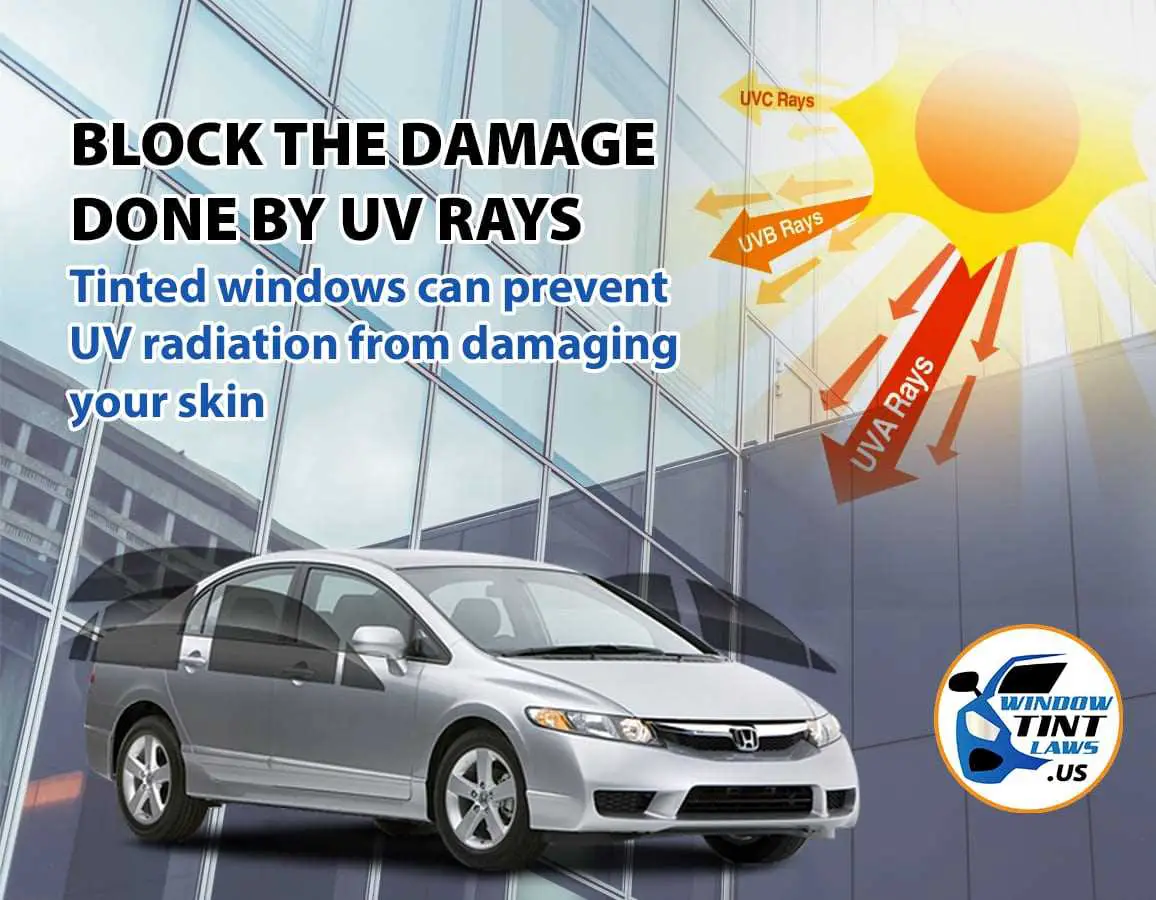Last Updated on February 4, 2024 by Vadym

Many car owners choose to have their windows tinted for various reasons. Tinted car windows not only enhance the aesthetics of a vehicle but also provide several practical benefits. One question that often arises is whether tinted car windows are effective at blocking harmful UV rays.
The answer is yes, tinted car windows can block UV rays. UV rays, also known as ultraviolet rays, are invisible and can cause damage to our skin and eyes. Prolonged exposure to UV rays can lead to sunburn, premature aging, and increase the risk of developing skin cancer.
Tinted car windows are designed to reduce the amount of UV rays that penetrate into the car’s interior. The tinting film applied to the windows acts as a barrier, filtering out a significant percentage of UV rays. The level of UV protection provided by tinted windows can vary depending on the darkness of the tint, with darker tints generally offering higher levels of UV blockage.
It is important to note that while tinted car windows can block a significant amount of UV rays, they do not provide complete protection. It is still possible for some UV rays to enter the vehicle through the untinted areas of the windows or through other openings such as the windshield or sunroof. Therefore, it is recommended to take additional measures to protect yourself from UV rays, such as wearing sunscreen and sunglasses, especially during long drives or when exposed to direct sunlight.
What Is UV Radiation and How Does It Affect Us?
UV radiation, or ultraviolet radiation, is a type of electromagnetic radiation that is emitted by the sun. It is invisible to the human eye and is divided into three main types: UVA, UVB, and UVC. UVA has the longest wavelength and is the least harmful, while UVC has the shortest wavelength and is the most damaging.
When our skin is exposed to UV radiation, it can have both short-term and long-term effects on our health. In the short term, UV radiation can cause sunburn, skin reddening, and eye irritation. These effects are often temporary but can be quite painful.
However, the long-term effects of UV radiation are much more serious. Prolonged exposure to UV radiation can damage the DNA in our skin cells, leading to genetic mutations and an increased risk of skin cancer. UV radiation is considered one of the primary causes of skin cancer, including both melanoma and non-melanoma types.
In addition to skin cancer, UV radiation can also contribute to the development of cataracts, a clouding of the lens in the eye that can cause vision problems and even blindness. It can also weaken our immune system, making us more susceptible to infections and diseases.
It is important to protect ourselves from UV radiation by taking precautions such as wearing sunscreen, sunglasses, and protective clothing, seeking shade during peak sun hours, and avoiding tanning beds. Tinted car windows can also provide some protection by blocking a portion of the UV radiation that enters the vehicle, reducing our exposure to harmful rays.
Overall, while some level of UV radiation is necessary for the production of vitamin D in our bodies, it is important to be mindful of the potential risks associated with excessive exposure. By taking steps to protect ourselves from UV radiation, we can reduce the risk of sunburn, skin cancer, and other health problems.
The Benefits of Tinted Car Windows
Tinted car windows are not just for aesthetics; they also provide a range of benefits that can enhance the driving experience.
1. Protection From Harmful UV Rays: One of the main advantages of tinted car windows is that they block a significant amount of harmful ultraviolet (UV) rays from the sun. Prolonged exposure to UV radiation can lead to skin damage and increase the risk of skin cancer. By reducing UV rays, tinted windows can help protect both the driver and passengers from these harmful effects.
2. Heat Reduction: Tinted car windows can significantly reduce the amount of heat that enters the vehicle. This is especially beneficial during hot summer months when the interior can become unbearably hot. Tinted windows help to reflect and absorb heat, keeping the car cooler and more comfortable for passengers.
3. Glare Reduction: Tinted car windows can also help reduce glare caused by sunlight and oncoming headlights. This glare can impair vision and make driving difficult or unsafe. By reducing glare, tinted windows can improve visibility and make driving safer.
4. Privacy and Security: Tinted car windows offer increased privacy and security. They make it harder for potential thieves to see into the vehicle, reducing the risk of break-ins. Additionally, tinted windows can help prevent valuable items inside the car from being easily visible, further deterring theft.
5. Interior Protection: Tinted car windows can also help protect the interior of the vehicle from fading and cracking caused by prolonged exposure to sunlight. UV rays can cause damage to seats, dashboard, and other materials, leading to costly repairs or replacements. Tinted windows help to block UV rays, preserving the condition of the interior.
6. Enhanced Style: Lastly, tinted car windows can enhance the overall style and appearance of the vehicle. They give a sleek and sophisticated look while providing all the practical benefits mentioned above. Tinted windows can improve the aesthetic appeal and make a car stand out from the crowd.
In conclusion, tinted car windows offer numerous advantages, including protection from harmful UV rays, heat reduction, glare reduction, privacy and security, interior protection, and enhanced style. Considering these benefits, tinting car windows can be a worthwhile investment for any car owner.
Do Tinted Car Windows Block UV Radiation?
Tinted car windows have become a popular accessory for many drivers, not only for their aesthetic appeal, but also for their ability to offer protection from the sun’s harmful rays. But do tinted car windows actually block UV radiation?
The short answer is yes, tinted car windows can block UV radiation to varying degrees depending on the type and darkness of the tint. Most car window tints are made with a film that contains UV-blocking agents, such as metallic particles or UV-absorbing dyes. These agents work by absorbing or reflecting UV radiation, preventing it from entering the car.
It is important to note that not all window tints offer the same level of UV protection. Some tints are specifically designed to block a higher percentage of UV rays, while others may only provide minimal protection. To ensure maximum protection from UV radiation, it is recommended to choose a high-quality tint that has been tested and certified for its UV-blocking capabilities.
UV radiation can pose various health risks, including skin cancer, premature aging, and eye damage. By blocking UV rays, tinted car windows can help reduce these risks and protect both the driver and passengers from harmful sun exposure.
In addition to UV protection, tinted car windows also offer other benefits. They can help to keep the car cooler by reducing the amount of heat and glare from the sun. This can improve comfort levels and reduce the need for air conditioning, thus potentially saving energy and fuel.
It is important to comply with local laws and regulations when tinting car windows, as there may be restrictions on the darkness of the tint and the areas of the car that can be tinted. Excessive tint darkness can impair visibility and may result in penalties or fines.
In conclusion, tinted car windows do block UV radiation, providing varying levels of protection depending on the type and darkness of the tint. By choosing a high-quality tint and complying with local regulations, drivers can enjoy the benefits of UV protection, improved comfort, and reduced energy consumption.
How Does Window Tinting Work?
Window tinting is a process of applying a specialized film to the surface of a car’s windows. This film is typically made from polyester and contains various pigments and dyes that give it its tinted appearance. The film is carefully shaped and cut to fit the specific size and shape of each window.
Window tinting works by blocking and filtering out certain types of light. The film is designed to absorb and reflect incoming sunlight, which helps reduce the amount of heat that enters the car. This can help keep the interior of the car cooler and more comfortable, especially on hot and sunny days.
In addition to reducing heat, window tinting also blocks harmful ultraviolet (UV) rays from entering the car. UV rays are a type of radiation that can cause damage to the skin and eyes, and can also fade and damage the interior of a car. The specialized film used in window tinting can block up to 99% of UV rays, providing protection for both the occupants of the car and the car itself.
Furthermore, window tinting can also provide added privacy and security. The tinted film makes it more difficult for others to see inside the car, providing a level of privacy for the occupants. It also reinforces the car windows, making them more resistant to shattering in the event of an accident or break-in.
It’s important to note that window tinting laws vary by jurisdiction, so it’s essential to check local regulations before tinting your car windows. In some areas, there may be restrictions on the level of tint darkness or the areas of the car that can be tinted. Violating these laws can result in fines or penalties, so it’s important to comply with the local regulations.
In conclusion, window tinting works by applying a specialized film to car windows that blocks and filters out certain types of light. It reduces heat, blocks harmful UV rays, provides privacy, and enhances security. Understanding how window tinting works can help you make an informed decision about whether it’s the right choice for your car.
Factors to Consider When Tinting Car Windows
Tinting car windows can provide several benefits, including enhanced privacy, reduced heat and glare, and improved aesthetics. However, there are several factors that you should consider when deciding to tint your car windows.
- Laws and regulations: Before proceeding with window tinting, it is essential to research and comply with the local laws and regulations regarding the maximum allowable tint darkness. Different states and countries have different requirements, and failing to adhere to these regulations can result in fines and other legal consequences.
- Tint type: There are various types of window tint available, including dyed film, metalized film, hybrid film, and ceramic film. Each type has its own advantages and disadvantages in terms of color stability, heat rejection, and UV protection. Research the different types of tint and choose the one that best suits your needs.
- Tint shade: Window tint comes in different shades, ranging from very light to extremely dark. The shade you choose depends on your personal preference and the level of privacy you desire. Keep in mind that darker tint may hinder nighttime visibility and potentially attract unwanted attention from law enforcement.
- Installation quality: Proper installation of window tint is crucial to ensure its longevity and effectiveness. It is recommended to choose a reputable and experienced professional installer who can guarantee a flawless installation and provide a warranty for the tint. Poorly installed tint may have bubbles, peeling, or fading, which can compromise its functionality.
- Cost: Window tinting prices can vary depending on factors such as the type of tint, the size and shape of the windows, and the complexity of the installation. Consider your budget and compare quotes from multiple installers to find the best value for your money. However, it is important to prioritize quality and expertise over cost to ensure a satisfactory result.
By carefully considering these factors, you can make an informed decision when tinting your car windows and enjoy the benefits of a well-executed tint job.

